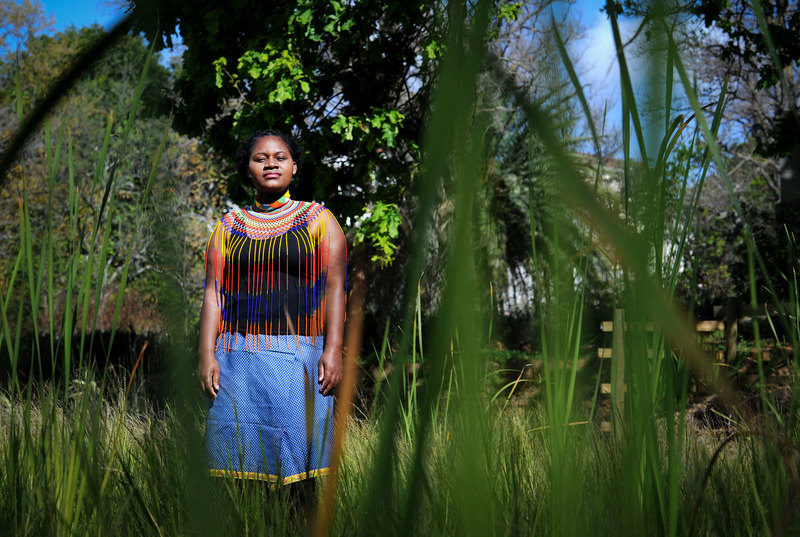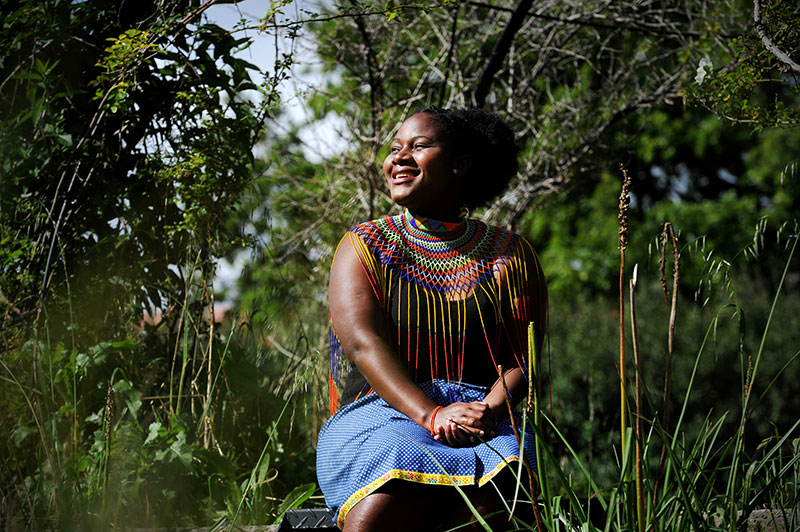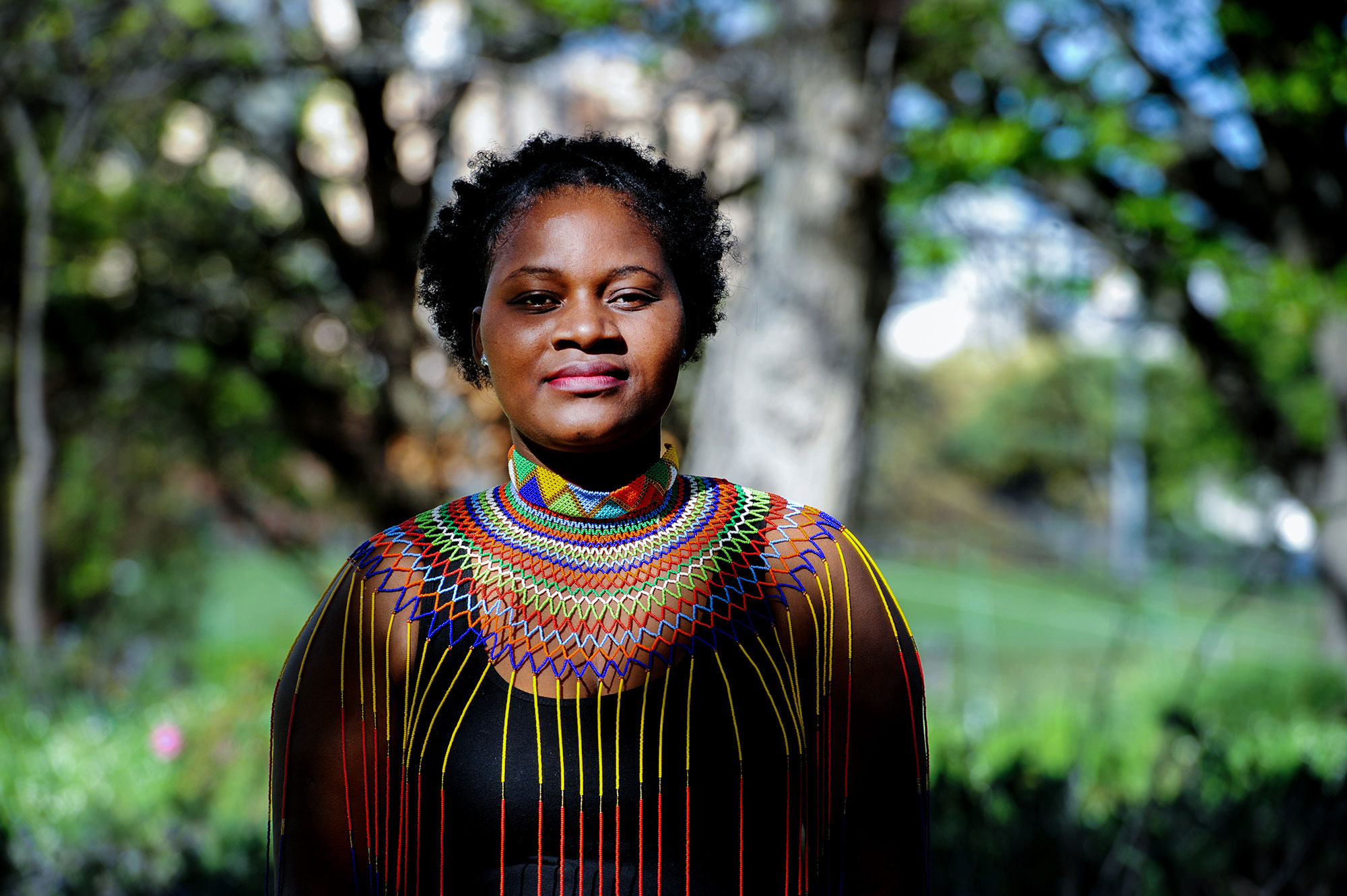Barefooted scholar now a joint PhD candidate
09 September 2021 | Story Helen Swingler. Photos Lerato Maduna. Voice Neliswa Sosibo. Read time 7 min.
It wasn’t the prospect of rogue soldiers, wild animals or muti killers that worried the young Bongai Munguni on her four-hour walk from primary school each day, reaching the hearth long after the cooking fire had gone out – it was the chance of meeting the ghosts who walk.
People in the community talked about the spectres, the spirits of the dead, and the young girl remembered. And on the road between Mozambique where her family were maize subsistence farmers in the Mossurize District, and her school across the border in Zimbabwe, there was plenty of time to think – and imagine.
Starting her first four-hour trek at 05:00 each morning, Munguni fretted about being late for school at Mafumise Primary School in Chipinge. She travelled light and walked barefooted. Shoes were for special occasions, said the University of Cape Town (UCT) joint PhD candidate.
But in the dark, after extra lessons when she left school at 16:00, it was different.
Sometimes the border post guards gave her water or sugar cane. The sweet juices sustained her. But she was hungry for something else: knowledge.

Born in Zimbabwe in 1990, Munguni’s future was tied to her culture; as a girl she would not get much education and was destined to marry young and become a teenage mother. But even when her parents took her out of school for two and a half years after a local Mozambican woman was murdered, she was determined to return.
Earn and learn
Carrying a load of bananas to sell at her old school one day, her former teachers spotted her. After explaining her situation, they offered to pay for her to write the Grade 7 national exams. So, by day she was out in the fields helping her mother; at night she studied beside the flames of a grass fire.
When her family said there were no funds for secondary school, Munguni applied for a job at a Zimbabwean tea plantation that offered “earn-and-learn” opportunities.
“We picked tea leaves from 06:00 to midday and attended school from 13:00 to 19:00.”
“We picked tea leaves from 06:00 to midday and attended school from 13:00 to 19:00,” she recalled. “Combining school and work was very tough, but it was good, as it offered a means to an education for those who couldn’t afford normal schools.”
Eschewing the idea that girls should marry young, after high school Munguni enrolled for a bachelor’s degree in economics at the University of Zimbabwe, funded by a Cadet Scholarship from the Zimbabwe government and another from the Zimbabwe Revenue Authority, which also allowed her to live in residence.
Serendipity and a PhD
Waiting for her graduation, Munguni took a job as a maid in Mount Pleasant to save up for a graduation gown and fees. It was expedient. But two weeks into the job the University of Zimbabwe offered her a teaching assistant post. Her monthly salary rocketed from US$60 to US$1 500.
She was also able to study towards her master’s while teaching, and graduated in 2016, capped by the late former president of Zimbabwe, Robert Mugabe.
But Munguni wasn’t done yet, although she didn’t know it. Helping a friend apply to study at UCT, she used her own name and details as a test run. A few weeks later she received a message to say her PhD application to UCT’s School of Economics had been successful!
She obtained a scholarship through the Southern Africa Labour and Development Research Unit (SALDRU) and the African Centre of Excellence for Inequality Research through her supervisor, Professor Murray Leibbrandt. She began in 2017 and two years later, through a joint academic agreement between UCT and the University of Bristol, and funded by a Cotutelle Scholarship, Munguni entered a joint PhD initiative: the inaugural UCT–Bristol University Researchers without Borders programme.

Munguni was one of eight PhD candidates from sub-Saharan Africa to qualify for the programme. The candidates are working on research projects that harness the strengths and capabilities of both institutions.
Her research is a mixed methods study on the cycle of poverty among rural women in Mozambique. The quantitative research will underpin her PhD in Economics through UCT, and the qualitative research will inform her PhD in Policy Studies through the University of Bristol.
Pay it forward
Munguni looks back at her younger self with amazement – and recognition. But there’s other work to be done. There’s the matter of paying it forward.
She has joined a group of professionals who are teaching almost all secondary level subjects to children in Zimbabwe, free via WhatsApp. She and friends have also raised £2 600 through a crowdfunding campaign to sink a borehole in her home village in Mozambique. Originally intended for her parents, she has applied her quantitative and qualitative economics background to ensure maximum advantage for the community.
The solar-powered borehole will pipe clean water to homes and facilities in the village and an educare centre for the village’s babies and young children. Solar power will also provide lighting, particularly to the local marketplace and villagers’ homes. These resources will change the fortunes of the village’s girl children and women, Munguni said, releasing them from the burdens of carrying water to the village and tending their younger siblings while their mothers work the fields.
And give them time to go to school.
Munguni hopes to extend opportunities to a learning facility for adults, particularly targeting women and helping the community to venture into farming projects, using the precious piped water.
Break the cycle
She is adamant that simple but innovative thinking can break the cycle of poverty for rural women. It was almost her own fate but for the support of teachers who treated her as their own, and her parents, particularly her father, who recognised her desire to go to school – and gave her the freedom to choose.
That choice has been like gold.
Munguni plans to take her mother to her graduations at UCT and the University of Bristol when the time comes, and COVID-19 allowing. Next up will be a postdoc – and she has her eye on Oxford or Harvard.
“My desire to be educated was just a dream when I was growing up. I am glad to say that I am going to be awarded two PhDs when I finish my studies – it’s more than a dream come true!”
 This work is licensed under a Creative Commons Attribution-NoDerivatives 4.0 International License.
This work is licensed under a Creative Commons Attribution-NoDerivatives 4.0 International License.
Please view the republishing articles page for more information.










